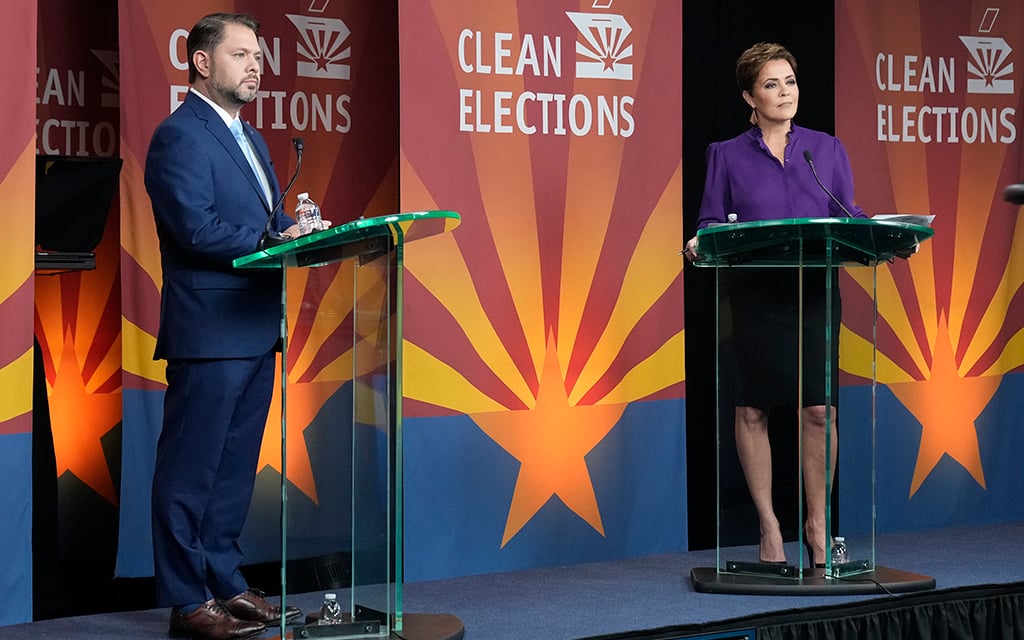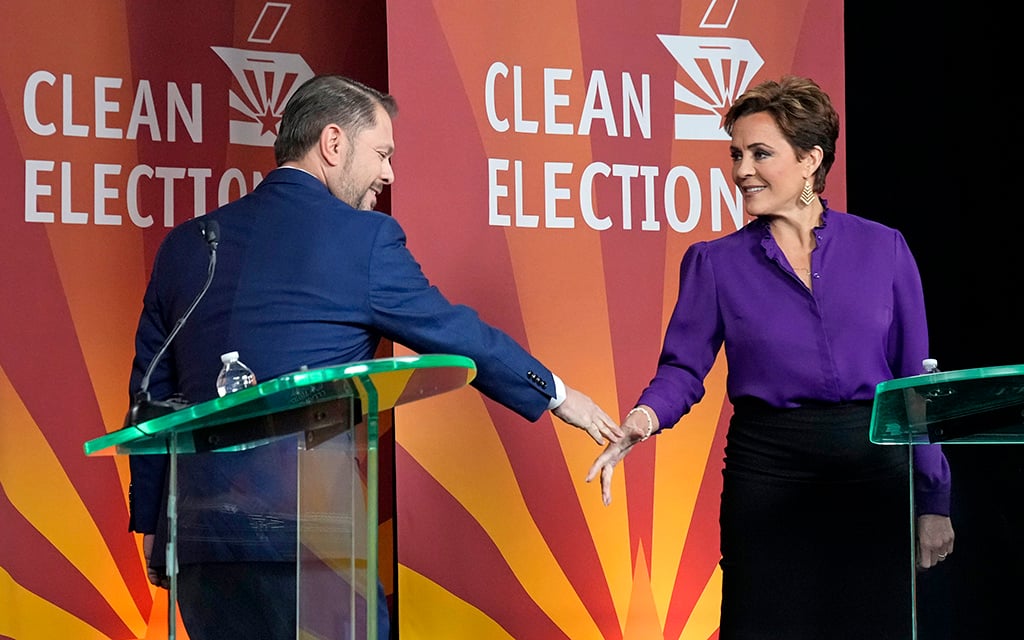
U.S. Rep. Ruben Gallego and Kari Lake during Arizona U.S. Senate debate on Oct. 9, 2024, in Phoenix. It is expected to be their only debate before Election Day. (Pool photo by Cheryl Evans/Arizona Republic)
In the only scheduled debate for Arizona’s open U.S. Senate race, Democratic Rep. Ruben Gallego sought to cast Republican Kari Lake as having extreme views. Lake said Gallego had undergone an “extreme makeover” to make his liberal views more palatable to moderate and conservative voters.
Lake, a longtime news anchor in Phoenix, came to national attention in 2022 as the Republican gubernatorial nominee who aligned herself with the debunked 2020 election claims of former President Donald Trump; she lost the gubernatorial race. Gallego, a U.S. Marine Corps veteran, is ceding the House seat he’s held since 2015 to run for Senate.
Lake focused on immigration, repeating several false claims from her campaign and Trump’s. Gallego attacked Lake over abortion, including her past support for a strict 1864 abortion ban that briefly became state law after the U.S. Supreme Court overturned Roe v. Wade.
Here’s a rundown of several claims the two candidates made during the Oct. 9 debate, sponsored by the Arizona Citizens Clean Elections Commission.
Lake’s false immigration claims
Lake: “The only piece of (immigration) legislation that Mr. Gallego has put forth was not about border security. It was about removing the word ‘illegal alien’ from anything in the federal government paperwork.”
Gallego was one of 13 Democratic co-sponsors of the Correcting Hurtful and Alienating Names in Government Expression (CHANGE) Act in October 2015. However, he did not, as Lake said, “put forth” the legislation, which would be the job of the bill’s chief sponsor. (The bill did not pass.)
This was not Gallego’s sole piece of border-related legislation.
Gallego’s The Buck Stops Here Act, which passed the House in 2023, empowered the U.S. Treasury to target fentanyl money laundering tied to illicit trafficking.
Beyond that measure, Gallego was one of 37 House Democrats to support the Republican-backed Laken Riley Act, which would require the Department of Homeland Security to detain migrants who committed burglary or theft. The measure passed the House.
Gallego also introduced two other border-related bills: the Direct Hire Act, which would increase staffing of U.S. Citizenship and Immigration Services and U.S. Immigration and Customs Enforcement, and the Screening Efficiency Act, which would expedite asylum wait times.
Gallego has also said he supports the Biden-backed bipartisan border bill that failed to pass the Senate amid opposition from Trump.
Lake: Gallego “actually voted twice to have illegals vote.”
Gallego joined most Democrats in voting against two Republican measures that included the Safeguard American Voter Eligibility Act, or SAVE Act, which would require proof of citizenship to register to vote in federal elections. But the bills would not have allowed people in the country illegally to vote. rFederal law already prohibits noncitizen voting.
Gallego said the bill would create significant paperwork obstacles for U.S. citizens in Arizona who are eligible to vote.
Adding complexity to Gallego’s position is that he has sometimes taken a harder line on noncitizen voting than many Democrats.
On May 23, 2024, Gallego voted for a GOP bill that would prohibit noncitizens from voting in local elections in Washington, D.C. That vote came after Gallego voted against a similar bill on Feb. 9, 2023.
Separately, Gallego introduced the Voting Clarity Act of 2024, which would require Customs and Border Protection officers to inform migrants that they are not allowed to vote in federal elections if they’re not U.S. citizens.
Lake: “We’ve had 20 million people pour across our border. They’re taking jobs, they’re taking housing. This is why nobody can afford housing anymore, because we’re having to compete with people who have come in illegally.”
The 20 million figure is False, and the housing claim is Mostly False.
During Biden’s administration, immigration officials have encountered immigrants illegally crossing the U.S. border around 10 million times. When accounting for “got aways” — people border officials don’t stop — the number rises to about 11.6 million.
Encounters represent events, not admissions, so one person who tries to cross the border twice counts for two encounters. Not everyone encountered is let into the country. The Department of Homeland Security estimates about 4.2 million encounters have led to expulsions or removals.
About 3.9 million people have been released into the U.S. to await immigration court hearings under Biden’s administration, Department of Homeland Security data shows.
Experts agree that increased immigration leads to higher demand for limited housing, but they add that it is not solely, or even predominantly, responsible for higher housing prices. The shortage of available housing is mainly driving the higher housing costs.
Abortion
Gallego: Kari Lake “was willing to look at a mother and say, ‘I know your daughter was raped, but she does not have a right to an abortion.’ She was willing to say that just two years ago.”
Gallego’s comments leave the impression that Lake said those words to the mother of a rape victim. She didn’t.
When running for governor in 2022, Lake called a far-reaching abortion Arizona ban dating from 1864 — which had no exceptions for incest or rape — a “great law.”
But in April, when the Arizona Supreme Court revived the ban after the courts had put it on hold, Lake changed her view, posting on X that the law “is out of line with where the people of this state are.” (Arizona’s Democratic governor signed a law permanently repealing the 1864 law the following month, after it narrowly passed the Republican-controlled Legislature.)
Lake also told NBC News that she opposes a federal abortion ban.
Lake: “I agree with Ruth Bader Ginsburg. She said this should be a decision left to the states.”
Some legal experts, including the late liberal Supreme Court Justice Ruth Bader Ginsburg, thought Roe should have been decided on different constitutional grounds than the ones the justices used in 1973.
Ginsburg argued that Roe would have been better supported constitutionally if it had been based on the Constitution’s equal protection clause, which would have justified it on gender equality rather than the privacy rights implied in the 14th Amendment protecting abortion as a fundamental right. But this doesn’t mean that she favored leaving abortion law to the states.
Jeffrey Rosen, who authored the book “Conversations with RBG,” told The Washington Post in 2021 that Ginsburg was wary of a checkered, state-by-state system of abortion law, saying it would hurt poor women without the resources to travel.
“How could you trust legislatures in view of the restrictions states are imposing?” Ginsburg said. “Think of the Texas legislation that would put most clinics out of business.”
Child care
Gallego: “Right now, child care is more expensive than sending your kid” to Arizona State University.
True.
The average annual per-child cost of day care in Arizona was $16,675 in 2023, Self magazine estimated, based on data from sources including the Census Bureau and the Organization for Economic Cooperation and Development. That was higher than the national figure of $11,582 the same year, according to Child Care Aware of America, a national network of child care resources and referral agencies.
The Arizona child care figure exceeds the cost of Arizona State University’s in-state tuition, which for the 2024-25 academic year is $12,223.
Social Security
Lake: “Ruben Gallego, Kamala Harris and the Democrats will decimate (Social Security). They want to make it so that the age that you have to be to qualify to get your Social Security, they want to raise that.”
Gallego has vocally opposed cutting Social Security. In Congress, he has introduced several pieces of legislation aimed at making the costs of Social Security transparent and raising benefits. He is also backed by groups, such as the Arizona Alliance for Retired Americans and the National Committee To Preserve Social Security and Medicare, that advocate for expanding Social Security.
Harris doesn’t support raising the retirement age, either.
Elections
Gallego: Lake is “currently suing to be reinstated as governor.”
He has a point, though she was never declared governor and thus cannot be “reinstated.”
Lake has pursued a long-running lawsuit to overturn the results of the 2022 election, which she lost. Several court decisions dismissed her claims, which included the allegation that illegal votes were cast.
On June 11, 2024, the Arizona Court of Appeals decided that the trial court was correct to dismiss Lake’s claims. On July 11, 2024, Lake filed a notice of appeal with the state Supreme Court, so Gallego is correct to say the case continues.
PolitiFact Copy Chief Matthew Crowley, Senior Correspondent Amy Sherman and Staff Writer Maria Ramirez Uribe contributed to this report.

